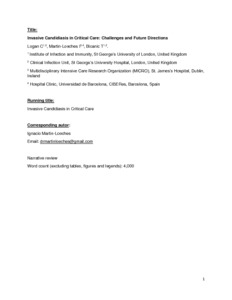Logan, C; Martin-Loeches, I; Bicanic, T
(2020)
Invasive candidiasis in critical care: challenges and future directions.
Intensive Care Med, 46 (11).
pp. 2001-2014.
ISSN 1432-1238
https://doi.org/10.1007/s00134-020-06240-x
SGUL Authors: Bicanic, Tihana
![[img]](https://openaccess.sgul.ac.uk/112441/1.hassmallThumbnailVersion/MANUSCRIPT%20REVISED%20%28clean%20without%20revisions%20highlighted%29%20IC%20in%20Critical%20Care%20Challenges%20%26%20Future%20directions.pdf)  Preview |
|
PDF
Accepted Version
Available under License ["licenses_description_publisher" not defined].
Download (269kB)
| Preview
|
Abstract
Invasive candidiasis is the most common critical care-associated fungal infection with a crude mortality of ~ 40-55%. Important factors contributing to risk of invasive candidiasis in ICU include use of broad-spectrum antimicrobials, immunosuppressive drugs, and total parenteral nutrition alongside iatrogenic interventions which breach natural barriers to infection [vascular catheters, renal replacement therapy, extracorporeal membrane oxygenation (ECMO), surgery]. This review discusses three key challenges in this field. The first is the shift in Candida epidemiology across the globe to more resistant non-albicans species, in particular, the emergence of multi-resistant Candida glabrata and Candida auris, which pose significant treatment and infection control challenges in critical care. The second challenge lies in the timely and appropriate initiation and discontinuation of antifungal therapy. Early antifungal strategies (prophylaxis, empirical and pre-emptive) using tools such as the Candida colonisation index, clinical prediction rules and fungal non-culture-based tests have been developed: we review the evidence on implementation of these tools in critical care to aid clinical decision-making around the prescribing and cessation of antifungal therapy. The third challenge is selection of the most appropriate antifungal to use in critical care patients. While guidelines exist to aid choice, this heterogenous and complex patient group require a more tailored approach, particularly in cases of acute kidney injury, liver impairment and for patients supported by extracorporeal membrane oxygenation. We highlight key research priorities to overcome these challenges in the future.
Statistics
Item downloaded times since 01 Oct 2020.
Actions (login required)
 |
Edit Item |



